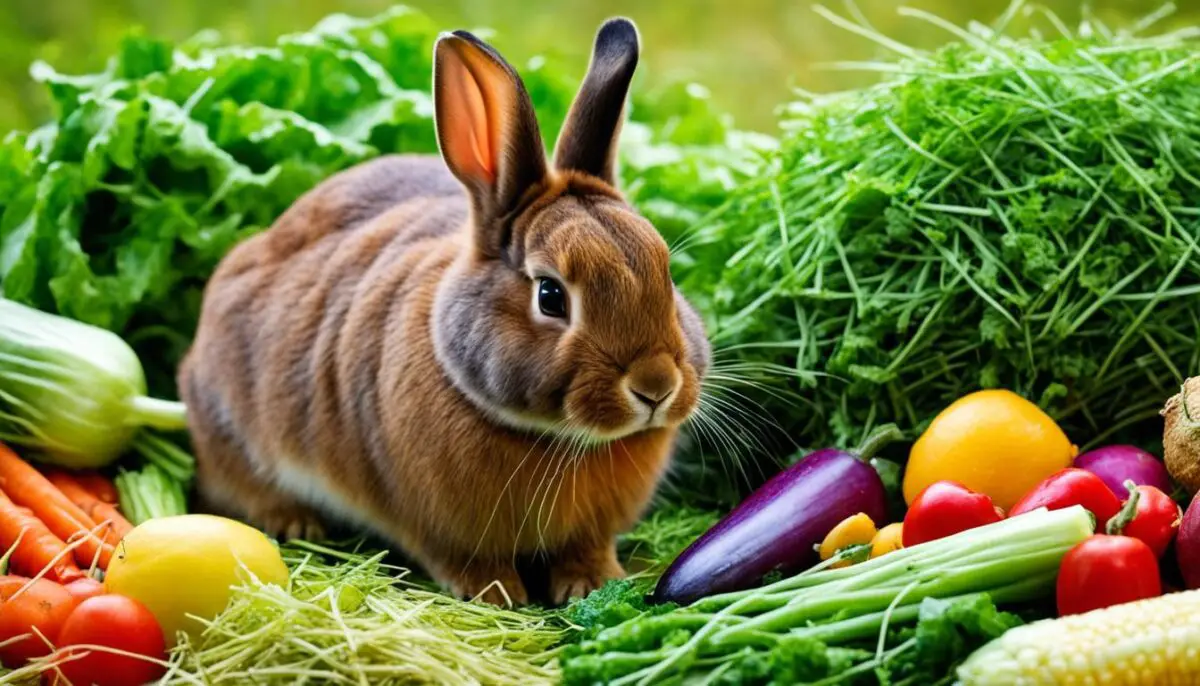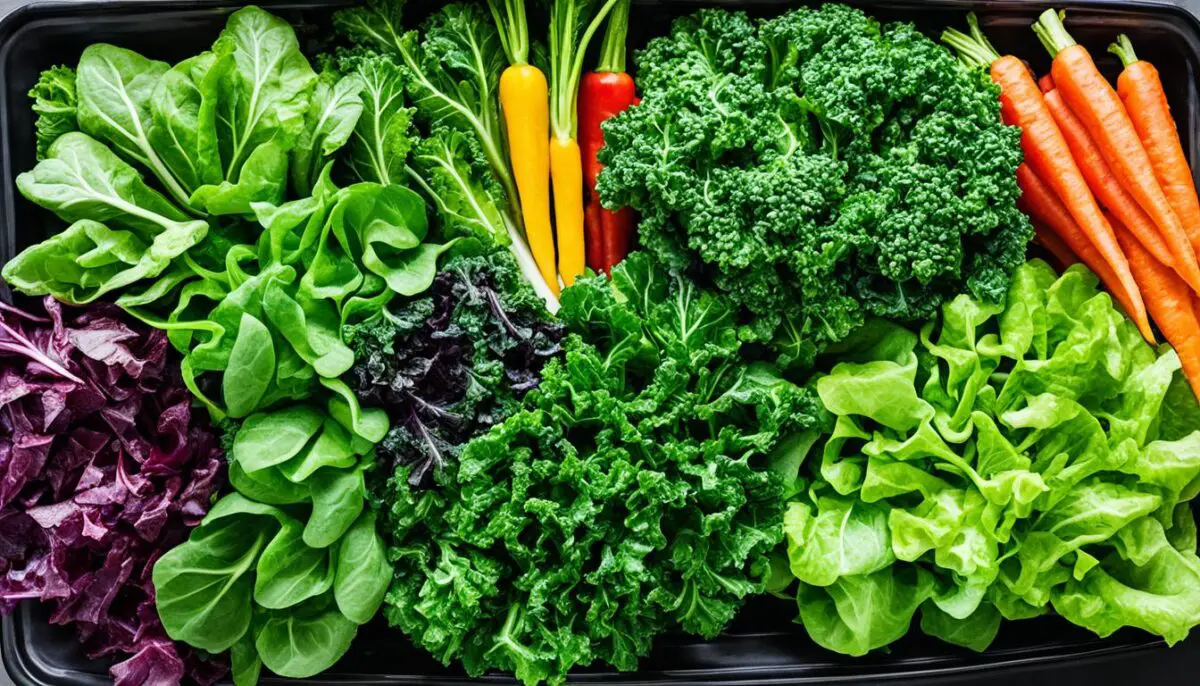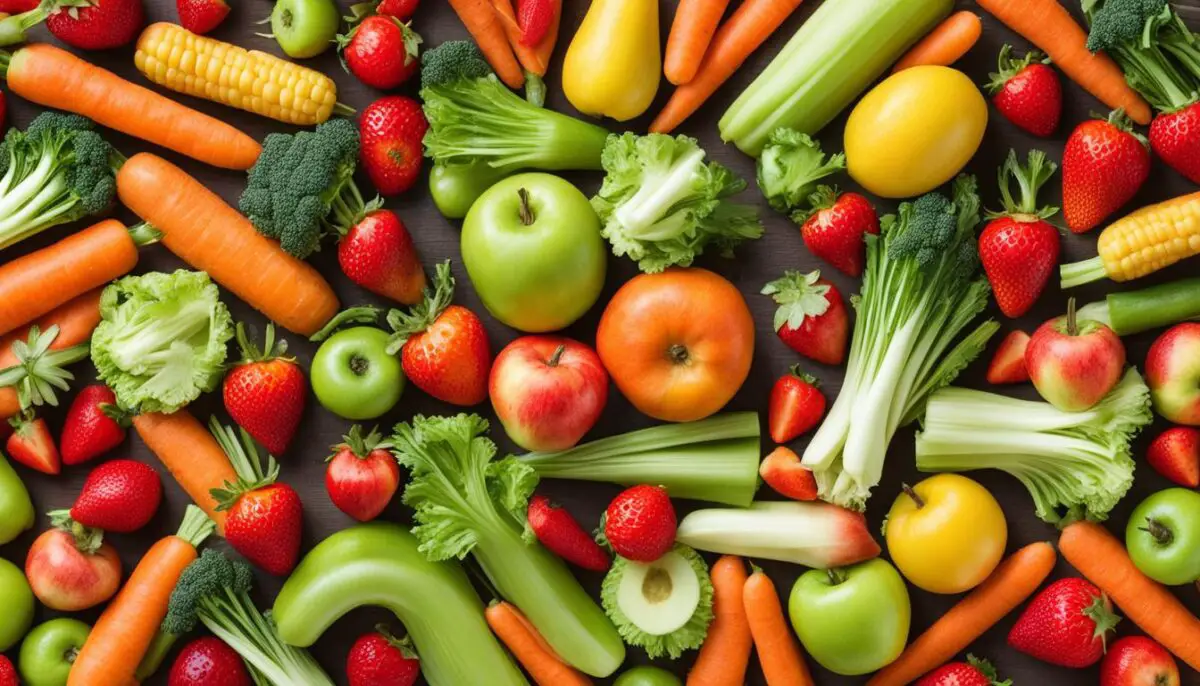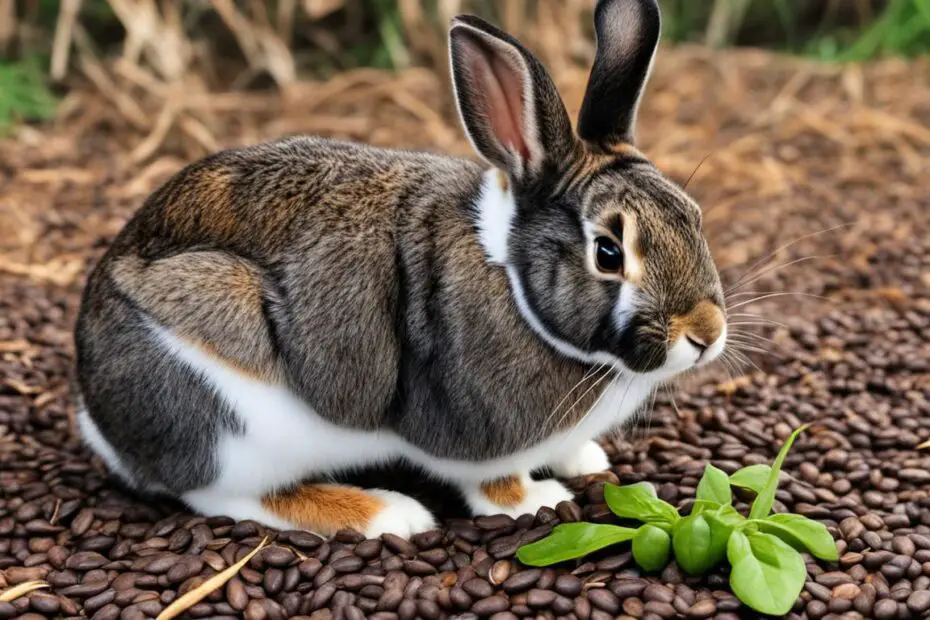Rabbits are herbivores with a complex digestive system, so it’s important to understand what they can and cannot eat. While seeds are a common part of many animals’ diets, they may not be suitable for rabbits. Let’s explore the do’s and don’ts of feeding your pet rabbit seeds.
Key Takeaways:
- Not all seeds are safe for rabbits to eat. Some seeds can be harmful and should be avoided.
- Rabbits have specific dietary needs, and their main diet should consist of hay, fresh vegetables, and a small amount of pellets.
- Hay is crucial for maintaining a healthy digestive system and promoting proper teeth alignment in rabbits.
- Leafy green vegetables are important for a balanced rabbit diet, but some should be given in limited quantities due to their calcium content.
- Pellets should only be used as a supplement to hay and vegetables, and treats should be given sparingly.
The Importance of Hay in a Rabbit’s Diet
When it comes to keeping your rabbit healthy and happy, hay plays a vital role in their diet. Not only does it provide essential nutrients, but it also helps maintain their digestive tract and keeps their teeth aligned.
High-quality grass hay, such as timothy, orchard, or brome, should make up the majority of your rabbit’s daily intake. These types of hay are rich in fiber, which is crucial for a rabbit’s digestive system. Fiber is essential for promoting regular bowel movements and preventing digestive issues like constipation.
Not only does fiber help with digestion, but it also plays a significant role in your rabbit’s dental health. Rabbits have continuously growing teeth, and a lack of proper chewing can lead to dental problems. The grinding motion involved in eating hay helps wear down their teeth and prevents alignment issues.
While young rabbits can enjoy any type of grass hay, including alfalfa, adult rabbits should avoid alfalfa hay due to its high protein and calcium content. Too much protein and calcium can lead to health issues like obesity and bladder stones.
It’s important to offer hay to your rabbit in unlimited quantities. This allows them to graze throughout the day, mimicking their natural feeding behavior in the wild. Providing a constant supply of hay ensures that your rabbit gets the necessary nutrients and keeps their digestive system and teeth in great shape.
To summarize, hay is a crucial component of a rabbit’s diet. It provides the necessary fiber for a healthy digestive system and promotes proper teeth alignment. Make sure to offer high-quality grass hay, avoid alfalfa hay for adult rabbits, and provide hay in unlimited quantities for continuous grazing and dental health.

Benefits of Hay in a Rabbit’s Diet:
- Provides essential fiber for a healthy digestive tract
- Promotes proper teeth alignment
- Mimics natural feeding behavior in the wild
- Helps prevent digestive issues like constipation
- Aids in wearing down continuously growing teeth
Vegetables for a Balanced Rabbit Diet
When it comes to maintaining a balanced diet for your rabbit, leafy green vegetables play a crucial role. They provide essential nutrients and dietary fiber that promote optimal health and digestion. It’s important to offer a variety of vegetables to ensure your rabbit gets a well-rounded diet. However, not all vegetables are safe for rabbits to consume, so it’s important to know which ones to include and which ones to avoid.
Safe Leafy Green Vegetables for Rabbits
Include the following leafy greens in your rabbit’s diet:
- Romaine lettuce
- Bok choy
- Mustard greens
- Carrot tops
- Cilantro
- Watercress
- Basil
These vegetables are safe for rabbits and can be offered in small quantities to provide variety and additional nutrition.
Leafy Greens High in Calcium for Rabbits
While leafy greens are beneficial for rabbits, some have a high calcium content that can lead to health issues if overfed. Feed the following vegetables in limited amounts:
- Collard greens
- Dandelion greens
- Parsley
- Kale
- Swiss chard
- Escarole
These vegetables are high in calcium, which is essential for maintaining healthy teeth and bones in rabbits. However, offering them in excess can lead to urinary problems and the formation of bladder stones.
Other Acceptable Vegetables for Rabbits
In addition to leafy greens, there are other vegetables that you can include in your rabbit’s diet:
- Broccoli
- Green peppers
- Brussels sprouts
- Endive
- Wheatgrass
- Radicchio
- Squash
These vegetables provide a range of nutrients and flavors to keep your rabbit’s diet interesting and varied.
Vegetables to Avoid Feeding Rabbits
While many vegetables are safe for rabbits, there are certain ones that should be avoided due to their potential harm or lack of nutrition:
- Iceberg lettuce: It has low nutritional value and can cause digestive upset.
- Celery: It has low nutritional value and can cause excessive gas in rabbits.
Lastly, carrots should be fed sparingly due to their high carbohydrate content. While carrots are a popular treat for rabbits, excessive consumption can lead to weight gain and digestive issues.
Remember to introduce new vegetables gradually and in small amounts to ensure your rabbit tolerates them well. A balanced diet consisting of safe vegetables, hay, and a small portion of pellets will help keep your rabbit healthy and happy.

Pellets and Other Foods to Supplement a Rabbit’s Diet
Rabbits have specific dietary requirements that should be met to ensure their overall health and well-being. While hay and vegetables form the foundation of a rabbit’s diet, pellets and treats can be offered to provide additional nutrients and variety. However, it’s important to understand the proper role of pellets and treats in a rabbit’s overall nutrition.
The Role of Pellets
Pellets should be viewed as a supplement rather than the main part of a rabbit’s diet. These compressed food pellets are formulated to provide a concentrated source of nutrients, including protein, fiber, vitamins, and minerals. However, excessive consumption of pellets can lead to obesity and digestive issues.
Recommended pellets for rabbits:
| Pellet Brand | Ingredients | Key Benefits |
|---|---|---|
| Bunny Chow | Timothy hay, vegetables, grains | High fiber content, well-balanced nutrition |
| Supreme Selective | Timothy hay, flaxseed, vegetables | Rich in fiber, promotes dental health |
| Oxbow Essentials | Timothy hay, soybeans, wheat | Optimum fiber, supports digestive function |
When choosing pellets for your rabbit, opt for those made primarily from timothy hay or other grass hays. These types of pellets are lower in calories and higher in fiber, which helps maintain a healthy weight and supports proper digestion. Feed pellets to adult rabbits in moderation, typically ¼ to ½ cup per 6 pounds of body weight per day, adjusting the amount based on your rabbit’s activity level and weight.
Healthy Treats and Fruits
Treats can be used to reward or bond with your rabbit, but it’s crucial to choose healthy options. Fresh fruits, such as apple, pear, and berries, can be given sparingly as special treats due to their high sugar content. Remember to remove any seeds or pits that could be harmful to your rabbit.
Healthy treats for rabbits:
- Dried papaya
- Small pieces of carrot (in moderation)
- A small portion of banana
Avoid high-calorie treats like cookies, nuts, seeds, grains, bread, and processed human foods. These items can lead to weight gain and digestive issues in rabbits. Keep treats to a minimal amount, such as 1-2 pieces per day, depending on the size of your rabbit. Always monitor their weight and overall health to ensure they are not becoming overweight or experiencing digestive problems.

Remember, treats should not exceed 10% of your rabbit’s daily food intake. The majority of their diet should still consist of hay and vegetables, which provide essential fiber and nutrients. Additionally, rabbits do not require extra vitamins if they are receiving a balanced diet.
Ensure your rabbit has access to fresh water at all times, as dehydration can lead to health issues. Providing appropriate chewing toys, such as untreated wood or hay-based toys, will also help maintain dental health.
References:
- Smith, T. (2021). The Rabbit Handbook: A Guide to Understanding and Caring for Your Bunny. Barron’s Educational Series.
- Lenox, M. (2019). Rabbit Food 101: What to Feed Your Bunny. Retrieved from https://rabbit.org/what-to-feed-your-rabbit/
Foods to Avoid Feeding Rabbits
When it comes to feeding your pet rabbit, it’s important to be aware of the foods that can be harmful to their health. Certain foods can be toxic and should be avoided to prevent illness and digestive issues. Here are some foods that you should never feed your rabbit:
- Onions, Garlic, and Other Members of the Onion Family: These foods can affect a rabbit’s immune system and potentially lead to illness or infection. It’s best to keep onions, garlic, and other members of the onion family out of your rabbit’s diet.
- Starchy Foods like Potatoes and Corn: These foods can cause digestive imbalances in rabbits and may lead to discomfort and gastrointestinal issues. It’s best to avoid feeding your rabbit starchy foods like potatoes and corn.
- Avocado and Rhubarb Leaves: Avocado and rhubarb leaves contain substances that are toxic to rabbits. These foods should be kept out of your rabbit’s diet to prevent any potential harm.
- Certain Varieties of Lettuce: Not all types of lettuce are safe for rabbits to consume. Iceberg lettuce, in particular, should be avoided due to its low nutritional value and potential for digestive upset. Stick to safer options like romaine lettuce and other leafy greens.
- Processed Human Foods: Cereal, crackers, bread, and other processed human foods may not provide the necessary nutrients that rabbits need. These foods are often high in sugar, salt, and unhealthy fats, making them unsuitable for rabbits.
- Certain Nuts, Seeds, Legumes, and Dairy Products: Some nuts, seeds, legumes, and dairy products can be harmful to rabbits. Avoid feeding your rabbit foods like almonds, peanuts, beans, peas, and dairy products.
By being mindful of the foods listed above and avoiding them in your rabbit’s diet, you can help ensure their health and well-being.
Dangerous Foods for Rabbits: Quotes from Experts
“Onions and garlic contain substances that can damage red blood cells in rabbits and may potentially lead to anemia. It’s best to keep these foods out of your rabbit’s diet to prevent any health issues.”
Dr. Jane Smith, Veterinarian
“Starchy foods like potatoes and corn are not easily digested by rabbits and can cause digestive imbalances, leading to discomfort and GI issues. It’s important to stick to foods that are easily digestible for rabbits.”
Dr. Mike Johnson, Animal Nutritionist
Foods to Avoid Feeding Rabbits
| Foods to Avoid | Reason |
|---|---|
| Onions, Garlic, and Other Members of the Onion Family | Affect the immune system and can lead to illness or infection |
| Starchy Foods like Potatoes and Corn | Can cause digestive imbalances and gastrointestinal issues |
| Avocado and Rhubarb Leaves | Contain toxic substances for rabbits |
| Certain Varieties of Lettuce (e.g., Iceberg Lettuce) | Low nutritional value and potential for digestive upset |
| Processed Human Foods | May lack necessary nutrients and be high in sugar, salt, and unhealthy fats |
| Certain Nuts, Seeds, Legumes, and Dairy Products | Can be harmful to rabbits |
Remember to provide your rabbit with a healthy and balanced diet to ensure their well-being. Consulting with a veterinarian can also provide valuable guidance on the best diet for your specific rabbit.
Conclusion
Feeding your pet rabbit a balanced diet is crucial for their overall health and well-being. Providing them with the right nutrients and fiber is essential to ensure their optimal growth and development. A diet primarily consisting of hay is important as it promotes a healthy digestive tract and helps maintain proper teeth alignment. Make sure to offer a variety of fresh vegetables in moderation, avoiding high-carbohydrate and high-fat foods.
Treats should be given sparingly and should consist of healthy options like small amounts of fruit or specially designed vegetable treats for rabbits. By following these guidelines and avoiding toxic foods, you can ensure that your rabbit stays happy and healthy. Remember to always provide fresh water and chew toys to support their dental health.
Take the time to learn about safe vegetables and suitable pellets for your rabbit’s diet. Avoid feeding them foods that can be harmful, such as onions, garlic, potatoes, corn, avocado, and certain varieties of lettuce. Processed human foods, nuts, seeds, legumes, and dairy products should also be avoided. Prioritizing a well-balanced diet and being mindful of what you feed your furry friend will contribute to their overall well-being.
FAQ
Can rabbits eat seeds?
No, while seeds may seem like a natural food for rabbits, they are not an essential part of their diet. Rabbits are herbivores and should primarily eat hay, supplemented with fresh vegetables and a small amount of pellets. Seeds can be harmful to rabbits and may cause digestive issues. It’s best to avoid feeding seeds to rabbits.
What is the best diet for a rabbit?
The best diet for a rabbit consists of high-quality hay, fresh vegetables, and a small amount of pellets. Hay is crucial for maintaining a rabbit’s healthy digestive tract and promoting proper teeth alignment. Leafy green vegetables like romaine lettuce, Bok choy, and cilantro should be offered in small quantities. Timothy pellets are recommended for adult rabbits in moderation. Treats should be given sparingly and should consist of healthy options like small amounts of fresh fruit.
Are there any seeds that are safe for rabbits to eat?
While seeds are not a necessary part of a rabbit’s diet, there are a few seeds that can be given in limited quantities as an occasional treat. Pumpkin seeds and sunflower seeds are some examples of safe seeds for rabbits. However, it’s important to note that seeds should never be a significant portion of a rabbit’s diet and should be given sparingly.
What foods should I avoid feeding my rabbit?
There are several foods that should be avoided when feeding rabbits. Onions, garlic, and other members of the onion family can affect a rabbit’s immune system and lead to illness or infection. Starchy foods like potatoes and corn should also be avoided, as they can cause digestive imbalances. Avocado, rhubarb leaves, and certain varieties of lettuce, such as iceberg lettuce, should be kept out of a rabbit’s diet due to their toxic properties. Processed human foods, including cereal, crackers, and bread, should not be fed to rabbits. Lastly, certain nuts, seeds, legumes, and dairy products should be avoided.
How much hay should a rabbit eat?
Hay is the most important part of a rabbit’s diet and should be offered in unlimited quantities. High-quality grass hay, such as timothy, orchard, or brome, should make up the majority of a rabbit’s daily intake. Hay provides the necessary fiber for maintaining a healthy digestive tract and promotes proper teeth alignment. It’s essential to ensure that rabbits have continuous access to hay for grazing and the grinding motion of the cheek teeth.


